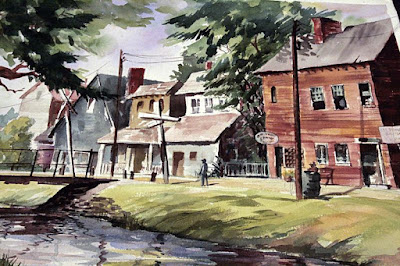"The Whole World Knows" -Eudora Welty
In “The Whole World Knows” by Eudora Welty, the experience of a man in a small town is displayed after his wife has an affair with a close friend. This story embraces figurative language at unique levels and utilizes it to tie into various themes. This, alongside the narrative progression of the story, can often times make it difficult to discern imagination from reality. Below are some questions that can help you sort out some of the deeper meanings within the text:
- How does Welty’s depiction of gender in the “The Whole World Knows” contribute to the overall meaning of the text? How does the way women are represented in “The Whole World Knows” compare to the way they are represented in stories in Winesburg, Ohio?
- Explain the significance of the mother’s interjections at different points in the “The Whole World Knows.”
- Identify how various symbols throughout the text contribute to the themes in the “The Whole World Knows.”
RPG, Untitled (1976)


ResponderExcluirIn response to the second question, the significance of the mother’s interjections at different points in “The Whole World Knows” became clearer to me by the end of the short story. At the beginning of the story, the seemingly random interjections of italicized speech (that of the narrator’s mother) further complicate the already confusing storyline. That the mother’s voice begins the story, however, points to the importance of these interjections. The questioning of her son in the opening lines — “where have you been, son?” — and her suggestion that he looks “unhappy" makes the reader wonder what might have prompted this reaction. Is she just a typical, worrisome, nagging mother? Or does she have real reason to worry for her son?
As the story progresses, it becomes clear that the mother’s worries are legitimate. Her interjections shed light on the physical and emotional dangers within Ran’s life. On page 149, the italicized speech reveals that Ran is in possession of his father’s gun, which prompts the reader to question his intentions. Because he has previously imagined killing Dugan (with a croquet mallet), the reader is led to believe that Ran will use the gun to murder Dugan in real life. We are surprised when he actually uses it to attempt suicide.
On page 156, the mother expresses dismay at the possibility that her son would reunite with the woman who cheated on him, because “the whole world knows” what she did to him. This line, which reveals the origin of the story’s title, is a final example of the disconnect between what the mother wants for Ran, and what Ran actually chooses to do. Each of the italicized portions reflect the mother’s pleas to Ran to leave his miserable life, to discard his gun and his cheating wife. But after each plea, Ran does what his mother has warned him against. Her foreboding never inspires a change of heart. The italicized portions of the text reflect the horrors of Ran’s life from an external point of view, which adds an interesting element to the majority of the text which is narrated by Ran himself. It is easy to imagine Ran envisioning his mother’s warnings against possessing a gun and reuniting with his wife as he continues to do these exact things, much to his own demise.
In the beginning of the story, the mother’s interjections make the narrative harder to follow, as her comments often do not align with the story. However, as the story progresses, these comments provide insight as to what is reality versus what is going on inside the disturbed mind of the narrator. The opening lines of “The Whole World Knows” show the mother expressing genuine concern for Ran’s whereabouts and well-being, as well as depicting a slight disconnect between the mother and son, as the son rejects his mother’s offer to come live with her. Later on in the story, the mother again shows her growing concerns for her son, as she says “Son, you’re walking around in a dream”, and “You keep things from me, son”. These statements help convey the idea that there may be something wrong with Ran, and that he may be detaching himself from his past life as he dwells on the more violent events that fill his consciousness.
ResponderExcluirThe reader is enlightened to a certain extent, as it is made apparent on page 147, that Jinny was unfaithful to Ran. The reader is then introduced to these violent events in Ran’s mind, as he vividly describes the brutal murder of Lonnie Dugan and his disdain for Jinny. “I beat Lonnie Dugan till there was nothing to know there. And I proved the male body.... Could be finished and done away with… Jinny could be taught that”(148). The story yet again leaves the reader confused as it directly contradicts the preceding events, while stating “Dugan said that. He spoke with no pain.” The mother’s injections clear up some of the confusion once more, as she asks her son “Son, I noticed that old pistol of your father’s in your nice coat pocket, what do you want with that old thing , your father never cared for it.” Furthermore, this represents how deeply disturbed Ran is, and foreshadows his attempted suicide at the end of the story.
Finally, the mother’s comments bring the whole story together, as she identifies the root of his anger, while informing her son that “if I thought you’d ever go back to that Jinny Stark, I couldn’t hold up my head…. The whole world knows that she did to do you.” The affair Jinny had with Dugan creates the new Ran, the one that is severely depressed and unfamiliar to his mother.